外研版(2019) 必修第三册 Unit 1 Knowing Me, Knowing You Using language (Grammar) 课件(19张)
文档属性
| 名称 | 外研版(2019) 必修第三册 Unit 1 Knowing Me, Knowing You Using language (Grammar) 课件(19张) | 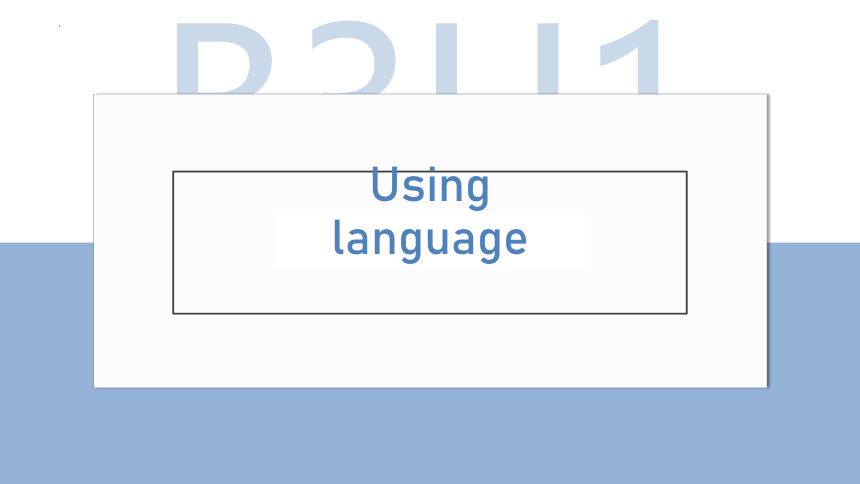 | |
| 格式 | zip | ||
| 文件大小 | 1.8MB | ||
| 资源类型 | 教案 | ||
| 版本资源 | 外研版(2019) | ||
| 科目 | 英语 | ||
| 更新时间 | 2022-09-02 18:11:02 | ||
图片预览

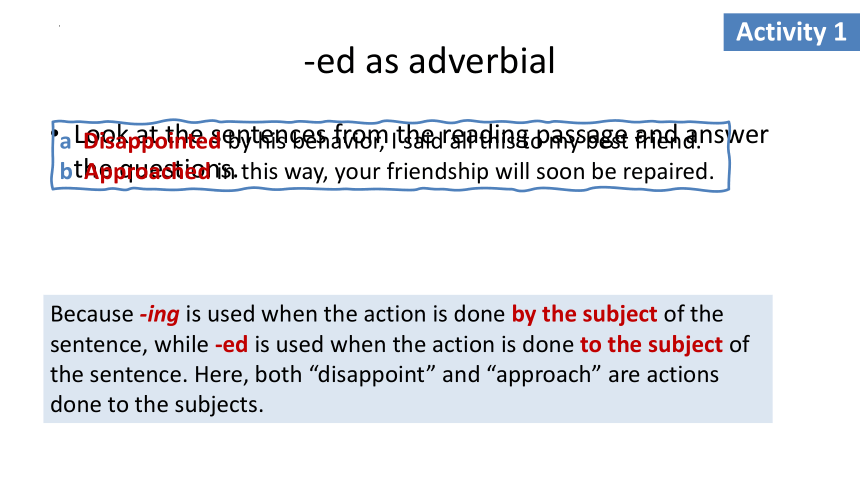
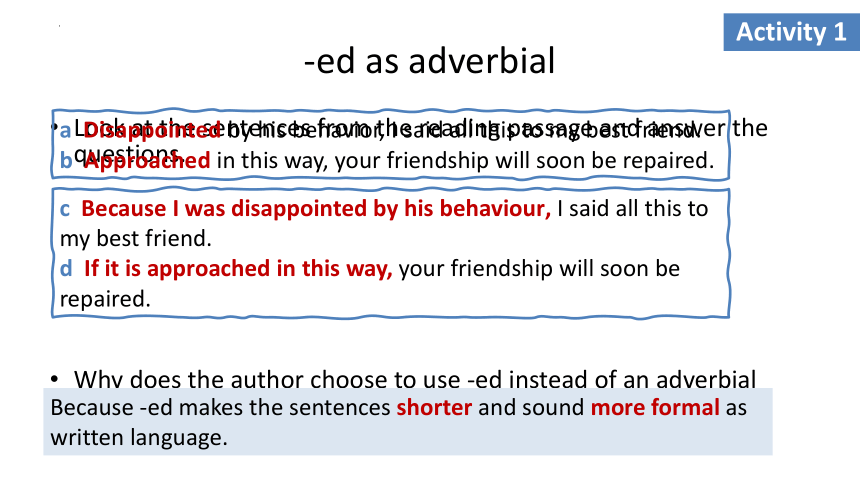
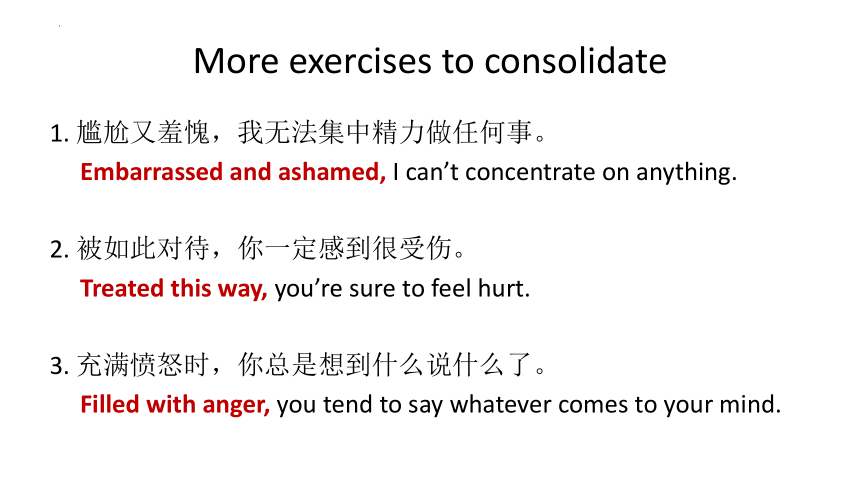
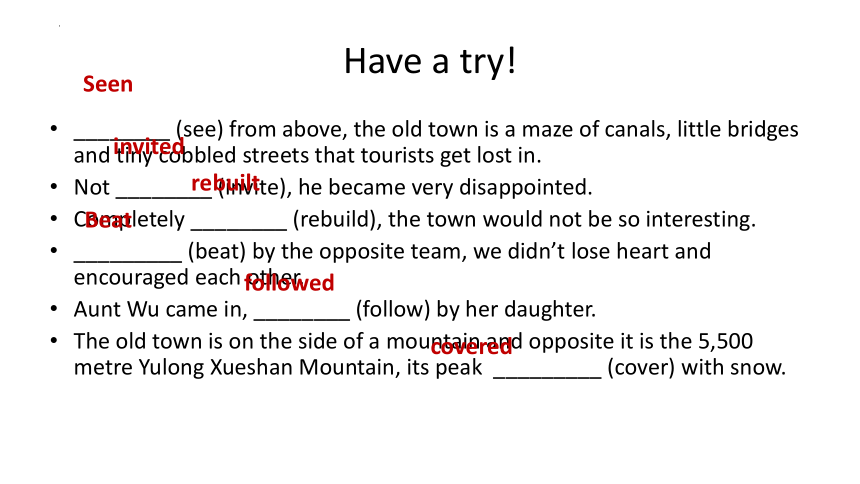
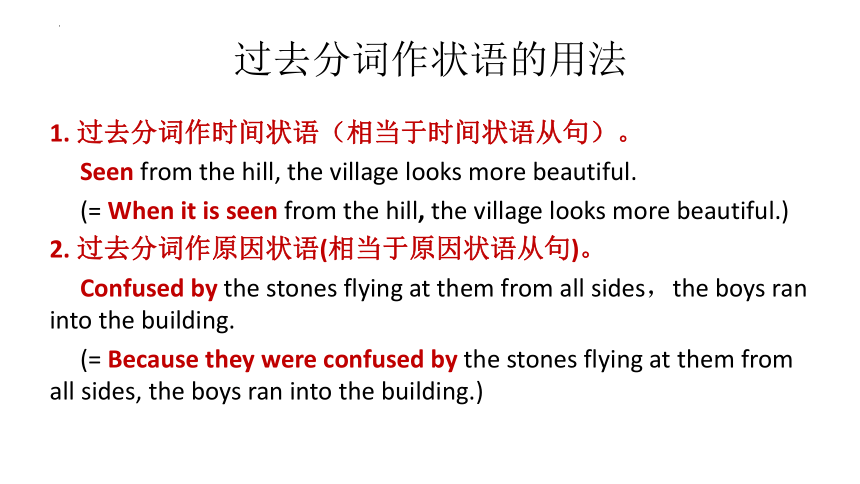
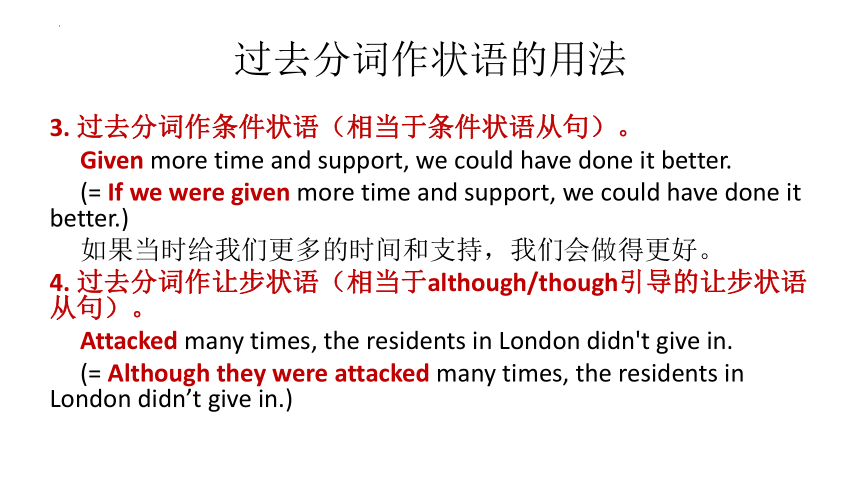
文档简介
(共19张PPT)
B3U1
Using language
-ed as adverbial
Look at the sentences from the reading passage and answer the questions.
Who was disappointed in sentence (a)
What is approached in sentence (b)
Activity 1
a Disappointed by his behavior, I said all this to my best friend.
b Approached in this way, your friendship will soon be repaired.
Because -ing is used when the action is done by the subject of the sentence, while -ed is used when the action is done to the subject of the sentence. Here, both “disappoint” and “approach” are actions done to the subjects.
-ed as adverbial
Look at the sentences from the reading passage and answer the questions.
Why does the author choose to use -ed instead of an adverbial clause in the reading passage
Activity 1
a Disappointed by his behavior, I said all this to my best friend.
b Approached in this way, your friendship will soon be repaired.
c Because I was disappointed by his behaviour, I said all this to my best friend.
d If it is approached in this way, your friendship will soon be repaired.
Because -ed makes the sentences shorter and sound more formal as written language.
More exercises to consolidate
1. 尴尬又羞愧,我无法集中精力做任何事。
Embarrassed and ashamed, I can’t concentrate on anything.
2. 被如此对待,你一定感到很受伤。
Treated this way, you’re sure to feel hurt.
3. 充满愤怒时,你总是想到什么说什么了。
Filled with anger, you tend to say whatever comes to your mind.
Have a try!
________ (see) from above, the old town is a maze of canals, little bridges and tiny cobbled streets that tourists get lost in.
Not ________ (invite), he became very disappointed.
Completely ________ (rebuild), the town would not be so interesting.
_________ (beat) by the opposite team, we didn’t lose heart and encouraged each other.
Aunt Wu came in, ________ (follow) by her daughter.
The old town is on the side of a mountain and opposite it is the 5,500 metre Yulong Xueshan Mountain, its peak _________ (cover) with snow.
Seen
invited
rebuilt
Beat
followed
covered
过去分词作状语的用法
1. 过去分词作时间状语(相当于时间状语从句)。
Seen from the hill, the village looks more beautiful.
(= When it is seen from the hill, the village looks more beautiful.)
2. 过去分词作原因状语(相当于原因状语从句)。
Confused by the stones flying at them from all sides,the boys ran into the building.
(= Because they were confused by the stones flying at them from all sides, the boys ran into the building.)
过去分词作状语的用法
3. 过去分词作条件状语(相当于条件状语从句)。
Given more time and support, we could have done it better.
(= If we were given more time and support, we could have done it better.)
如果当时给我们更多的时间和支持,我们会做得更好。
4. 过去分词作让步状语(相当于although/though引导的让步状语从句)。
Attacked many times, the residents in London didn't give in.
(= Although they were attacked many times, the residents in London didn’t give in.)
过去分词作状语的用法
5. 过去分词作方式或伴随状语(相当于方式状语从句,当表示伴随时,相当于一个并列句)。
Followed by his wolf dog, the hunter walked slowly in the forest.
(= The hunter walked slowly in the forest and his wolf dog followed him.)
6. 过去分词作结果状语(相当于结果状语从句)。
He failed in the competition, blamed by his companions.
(= He failed in the competition, so that he was blamed by his companions.)
过去分词作状语的用法
7. 过去分词作状语,起补充说明作用(相当于一个并列句)。
They eventually arrived at the destination, tired and excited.
(= They eventually arrived at the destination, and they became tired and excited.)
他们最终到了目的地,又累又激动。
Exercise
_____________________ (给予更多的关注), the trees could have grown better.
He couldn’t see what was written on the blackboard, __________________
________________________(坐在我们教室后面).
After his journey from abroad, Richard Jones returned home, ___________
(筋疲力尽).
He spent there a whole night, ___________________ (锁在房间里).
The old man went into the room, _____________________ (由他的妻子搀扶着).
Given more attention
seated at the back
exhausted
locked in the room
supported by his wife
of our classroom
注意事项
1. 过去分词作状语时,其前面可以带有相应的连词when, though, although, as if, as though, if, unless, until, once等。
Unless invited, I won’t attend the ball.
注意事项
例如:完成作业后,孩子们出去踢球了。
(判断正误) Finished their homework, the children went out to play football.
句子可改为:
1) Their homework finished, the children went out to play football.
2) Having finished their homework, the children went out to play football.
3) After the children finished their homework, they went out to play football.
4) With their homework finished, the children went out to play football.
(独立主格结构)
(改变了语态,用现在分词)
(相应的状语从句)
(with 复合结构)
注意事项
2. 过去分词所表示的动作,必须是逻辑主语所承受的动作。如果分词的逻辑主语与主句的主语不一致,则可以用下列方法来修正:
给分词添加自己的主语,构成独立主格结构;
给分词改变语态(现在分词与过去分词转换);
用相应的状语从句来表达;
用with复合结构。
注意事项
3. 有些常见的分词结构属于固定结构,其逻辑主语不需要和主句主语一致,也就是说,它们的主句主语和句子的主语没有关系,
如: compared with, judging from/by, generally/exactly/frankly speaking, considering, seeing, including, supposing/providing/provided等。
从他的外表来看,他应该是个富人。
Judging from his appearance, he is a wealthy man.
总的来说,你付出越多,收获越多。
Generally speaking, the more you pay, the more you get.
注意事项
4. v.- ed分词作状语时,否定形式为:否定词放在分词的前面。
即Not/Never/Hardly + - ed
虽没人问,他却跟他们说了那件事。
Not asked, he told it to them.
虽然没被邀请,但是他还是独自去了派对。
Although not invited, he went to the party alone.
注意事项
5. 有些过去分词已用作形容词,常用于系表结构,作状语时不表被动动作而表状态。这样的过去分词及短语常见的有:
seated (坐), hidden (躲), absorbed in (沉溺于), born (出生), dressed in (穿着), tired of (厌烦), determined (保持决心)等。
下定了决心要考上好大学,他每天刻苦学习。
Determined to go to a top university, he works hard on his study every day.
厌倦了城市的生活,她渴望在乡下平静的生活。
Tired of the city life, she desired to live in peace in the country.
用所给词的适当形式填空
If __________ (connect) to the campus network, you can get to it directly from your computer.
The flowers __________ (smell) sweet in the garden attract many visitors.
When first __________ (introduce) to the market, these products enjoyed a great success.
With trees, flowers and grass __________ (plant) everywhere, my hometown has taken on a new look.
Once __________ (ask) about her father, the girl will burst out crying.
connected
smelling
introduced
asked
planted
-ed as adverbial
Rewrite the underlined sentences with the -ed form.
Activity 2
Last week, attracted by a particular article in a magazine, Anne bought it.
Praised in class, Anne felt happy as well as ashamed.
Shocked by the decision, Anne did not know what to do.
-ed as adverbial
Read the plot summary and choose the correct form of the words.
Activity 3
Influenced
Believing
Prevented
separated
realising
B3U1
Using language
-ed as adverbial
Look at the sentences from the reading passage and answer the questions.
Who was disappointed in sentence (a)
What is approached in sentence (b)
Activity 1
a Disappointed by his behavior, I said all this to my best friend.
b Approached in this way, your friendship will soon be repaired.
Because -ing is used when the action is done by the subject of the sentence, while -ed is used when the action is done to the subject of the sentence. Here, both “disappoint” and “approach” are actions done to the subjects.
-ed as adverbial
Look at the sentences from the reading passage and answer the questions.
Why does the author choose to use -ed instead of an adverbial clause in the reading passage
Activity 1
a Disappointed by his behavior, I said all this to my best friend.
b Approached in this way, your friendship will soon be repaired.
c Because I was disappointed by his behaviour, I said all this to my best friend.
d If it is approached in this way, your friendship will soon be repaired.
Because -ed makes the sentences shorter and sound more formal as written language.
More exercises to consolidate
1. 尴尬又羞愧,我无法集中精力做任何事。
Embarrassed and ashamed, I can’t concentrate on anything.
2. 被如此对待,你一定感到很受伤。
Treated this way, you’re sure to feel hurt.
3. 充满愤怒时,你总是想到什么说什么了。
Filled with anger, you tend to say whatever comes to your mind.
Have a try!
________ (see) from above, the old town is a maze of canals, little bridges and tiny cobbled streets that tourists get lost in.
Not ________ (invite), he became very disappointed.
Completely ________ (rebuild), the town would not be so interesting.
_________ (beat) by the opposite team, we didn’t lose heart and encouraged each other.
Aunt Wu came in, ________ (follow) by her daughter.
The old town is on the side of a mountain and opposite it is the 5,500 metre Yulong Xueshan Mountain, its peak _________ (cover) with snow.
Seen
invited
rebuilt
Beat
followed
covered
过去分词作状语的用法
1. 过去分词作时间状语(相当于时间状语从句)。
Seen from the hill, the village looks more beautiful.
(= When it is seen from the hill, the village looks more beautiful.)
2. 过去分词作原因状语(相当于原因状语从句)。
Confused by the stones flying at them from all sides,the boys ran into the building.
(= Because they were confused by the stones flying at them from all sides, the boys ran into the building.)
过去分词作状语的用法
3. 过去分词作条件状语(相当于条件状语从句)。
Given more time and support, we could have done it better.
(= If we were given more time and support, we could have done it better.)
如果当时给我们更多的时间和支持,我们会做得更好。
4. 过去分词作让步状语(相当于although/though引导的让步状语从句)。
Attacked many times, the residents in London didn't give in.
(= Although they were attacked many times, the residents in London didn’t give in.)
过去分词作状语的用法
5. 过去分词作方式或伴随状语(相当于方式状语从句,当表示伴随时,相当于一个并列句)。
Followed by his wolf dog, the hunter walked slowly in the forest.
(= The hunter walked slowly in the forest and his wolf dog followed him.)
6. 过去分词作结果状语(相当于结果状语从句)。
He failed in the competition, blamed by his companions.
(= He failed in the competition, so that he was blamed by his companions.)
过去分词作状语的用法
7. 过去分词作状语,起补充说明作用(相当于一个并列句)。
They eventually arrived at the destination, tired and excited.
(= They eventually arrived at the destination, and they became tired and excited.)
他们最终到了目的地,又累又激动。
Exercise
_____________________ (给予更多的关注), the trees could have grown better.
He couldn’t see what was written on the blackboard, __________________
________________________(坐在我们教室后面).
After his journey from abroad, Richard Jones returned home, ___________
(筋疲力尽).
He spent there a whole night, ___________________ (锁在房间里).
The old man went into the room, _____________________ (由他的妻子搀扶着).
Given more attention
seated at the back
exhausted
locked in the room
supported by his wife
of our classroom
注意事项
1. 过去分词作状语时,其前面可以带有相应的连词when, though, although, as if, as though, if, unless, until, once等。
Unless invited, I won’t attend the ball.
注意事项
例如:完成作业后,孩子们出去踢球了。
(判断正误) Finished their homework, the children went out to play football.
句子可改为:
1) Their homework finished, the children went out to play football.
2) Having finished their homework, the children went out to play football.
3) After the children finished their homework, they went out to play football.
4) With their homework finished, the children went out to play football.
(独立主格结构)
(改变了语态,用现在分词)
(相应的状语从句)
(with 复合结构)
注意事项
2. 过去分词所表示的动作,必须是逻辑主语所承受的动作。如果分词的逻辑主语与主句的主语不一致,则可以用下列方法来修正:
给分词添加自己的主语,构成独立主格结构;
给分词改变语态(现在分词与过去分词转换);
用相应的状语从句来表达;
用with复合结构。
注意事项
3. 有些常见的分词结构属于固定结构,其逻辑主语不需要和主句主语一致,也就是说,它们的主句主语和句子的主语没有关系,
如: compared with, judging from/by, generally/exactly/frankly speaking, considering, seeing, including, supposing/providing/provided等。
从他的外表来看,他应该是个富人。
Judging from his appearance, he is a wealthy man.
总的来说,你付出越多,收获越多。
Generally speaking, the more you pay, the more you get.
注意事项
4. v.- ed分词作状语时,否定形式为:否定词放在分词的前面。
即Not/Never/Hardly + - ed
虽没人问,他却跟他们说了那件事。
Not asked, he told it to them.
虽然没被邀请,但是他还是独自去了派对。
Although not invited, he went to the party alone.
注意事项
5. 有些过去分词已用作形容词,常用于系表结构,作状语时不表被动动作而表状态。这样的过去分词及短语常见的有:
seated (坐), hidden (躲), absorbed in (沉溺于), born (出生), dressed in (穿着), tired of (厌烦), determined (保持决心)等。
下定了决心要考上好大学,他每天刻苦学习。
Determined to go to a top university, he works hard on his study every day.
厌倦了城市的生活,她渴望在乡下平静的生活。
Tired of the city life, she desired to live in peace in the country.
用所给词的适当形式填空
If __________ (connect) to the campus network, you can get to it directly from your computer.
The flowers __________ (smell) sweet in the garden attract many visitors.
When first __________ (introduce) to the market, these products enjoyed a great success.
With trees, flowers and grass __________ (plant) everywhere, my hometown has taken on a new look.
Once __________ (ask) about her father, the girl will burst out crying.
connected
smelling
introduced
asked
planted
-ed as adverbial
Rewrite the underlined sentences with the -ed form.
Activity 2
Last week, attracted by a particular article in a magazine, Anne bought it.
Praised in class, Anne felt happy as well as ashamed.
Shocked by the decision, Anne did not know what to do.
-ed as adverbial
Read the plot summary and choose the correct form of the words.
Activity 3
Influenced
Believing
Prevented
separated
realising
